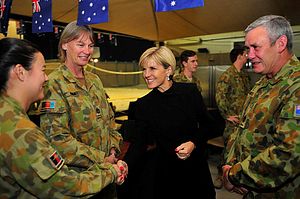While Tony Abbott was making world headlines for another screaming misstep, his foreign minister Julie Bishop was in Afghanistan renewing Australia’s commitment there on a surprise Australia Day visit.
Bishop met with Afghan President Ashraf Ghani and celebrated the holiday with Australian servicemen and women stationed there, who number some 400. The president apparently asked Western forces to stay in the country, giving what Bishop termed a “compelling case.”
The Australian foreign minister said of her hour-long discussion with the president: “If Afghanistan is able to create a functioning nation … then that will be a significant breakthrough in the fight against global terrorism.” Bishop has made the fight against global terrorism and homegrown terrorism one of her platforms as foreign minister. Last November she used her address at the United Nations Security Council, which Australia then headed, to speak on terror threats and the need for international cooperation. “Terrorists are younger, more violent, more innovative and highly interconnected. They are masters of social media – to terrorize and to recruit – and are very tech savvy. They incite each other. They communicate their propaganda and violence directly into our homes to recruit disaffected young men and women.”
Last year Australia began again to worry about its domestic security after a large anti-terror raid (which led to one conviction) in September in Sydney that seemed a fine piece of security theater, reports of many Australians travelling to Syria to join the Islamic State – including one man who brought his young sons – and a hostage situation in Sydney that left three, including the gunman, dead.
However, Australia’s anti-terror work also has a global bent. Bishop told troops, “We’re in an epic battle. We are facing threats from non-state actors who have no regard for boundaries or for laws, no respect for civilized behavior or humanity, whether it’s the Taliban … or Daesh.” There is a worry, she said, that elements of ISIS (which Bishop tends to refer to as Daesh) would team up with Taliban still within Afghanistan. A second Iraq is a worry for both the U.S. and its allies, such as Australia. Tony Abbott has been particularly strident in his desire to combat what he tends to call “an apocalyptic death cult” and has since the group began its huge push into Iraq been very enthusiastic about sending troops in if necessary; the Royal Australian Air Force has been delivering food to civilians in Iraq and has been undertaking airstrikes, as well as sending weapons to Iraqis fighting the group.
In early January, Abbott visited Iraq to meet his counterpart Haider Al-Abadi, where he pledged Australia’s support against ISIS (also known as ISIL). He also said that Canberra wished to deepen cooperation with the government of Iraq. Abbott told Australian troops at the time, “everyone wants you to help the Iraqis to knock off ISIL, Daesh – whatever we want to call it – it is a death cult, it has declared war on the world, and you are doing our bit for Australia, for the Middle East, and for the wider world.”
In her visit, Bishop also stressed the need for economic help and aid. A functioning Afghanistan would be “significant breakthrough in the fight against global terrorism.”
After Afghanistan, Bishop flew on to the UAE to meet her counterpart H.H. Sheikh Abdullah bin Zayed Al Nahyan. This leg of her trip did not garner as much attention, although within a backslapping commentary on their ongoing friendship and increasing ties was a commitment on both sides to work together on “countering extremism and violence,” according to the Emirates News Agency.
Helen Clark was based in Hanoi for six years as a reporter and magazine editor. She has written for two dozen publications including The Diplomat (as Bridget O’Flaherty), Time, The Economist, the Asia Times Online and the Australian Associated Press.

































